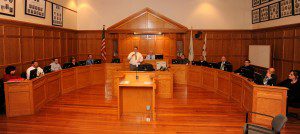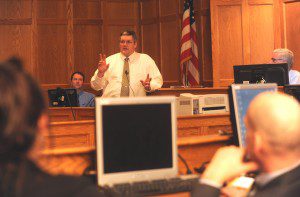
David Baker, center, an assistant professor of pharmacy administration at Western New England University, speaks to the members of the city’s Planning Board and Board of Health about the recently approved medical marijuana law during a joint meeting in the City Council chamber last night. (Photo by Carl E. Hartdegen)
WESTFIELD – In a joint meeting last night, members of the city’s Planning Board and Board of Health learned that, although an act has been passed to allow the medical use of marijuana, the Massachusetts Department of Public Health has not promulgated the regulations necessary to administer the provisions of the act.
And, possession, use and cultivation of marijuana remains a felony under federal law.
David Baker, an assistant professor of pharmacy administration at Western New England University, was the guest at the meeting and explained that, since the regulations have not been written, it is unclear what the effects will be of the Humanitarian Medical Use of Marijuana Act which was passed by initiative petition.
He also explained how other states are coping with medical marijuana laws and said that in many cases local police have given up in terms of enforcing marijuana laws.
Baker said that the act provides for three types of registration cards which will allow registrants legal to access to marijuana.
The act allows users, care givers and dispensaries to register and the registration cards will be, Baker said, like “Get out of jail free” cards.
Card holders who have their card on their persons will be immune from arrest and prosecution under state law and their supply of marijuana, and attendant paraphernalia, may not be seized.
An applicant to the Department of Public Health for a registration card will need to have a physician’s certification which states that the applicant has a condition that may benefit from marijuana use and that the benefits of such use outweigh the risks.
The act states that marijuana may be used for a “debilitating medial condition” and cites examples such as cancer, glaucoma, AIDS or hepatitis C but it also allows marijuana use to treat “other conditions as determined in writing by a qualifying patient’s physician”.
The act provides that physicians who certify an applicant will be free from “state arrest, prosecution, penalty or denial of any right or privilege” resulting from certification of a patient.
In additions to doctors, certification may be made by a person supervised by a physician, such as a nurse practitioner or physician’s assistant who is authorized to prescribe medications but Baker stressed that no prescriptions are authorized by the act.
He pointed out that a prescription stipulates dosage and frequency of use, as well as the number of refills available and an expiration date, and none of those limitations apply to a certification required for a registration card.
Instead, a user will be allowed to possess a 60-day supply of marijuana but, Baker said, the act does not define how much marijuana constitutes a 60-day supply.
The act also provides for registration cards to be issued for medical marijuana dispensaries which will be allowed to acquire, cultivate, process and possess marijuana and create derivative products such as foods, tinctures and oils which they can distribute, dispense and transport.
Such dispensaries must be non-profit institutions and applicants may not have any previous felony convictions for drug offenses. Under the act, a dispensary must be “an enclosed locked facility.”
Baker said that, since there is no legal way to acquire a supply of marijuana except for purchasing it from another dispensary, he expects dispensaries will cultivate the marijuana needed.
And, he said, given the relatively short growing season in New England, he expects that warehouse type structures where a large amount of marijuana plants can be grown indoors will be in demand for dispensaries.
The act requires that, initially, 35 treatment centers be established in the commonwealth but requires that there be at least one in each of the state’s 14 counties.
Individual users who may be unable to access a dispensary may apply for a waiver to cultivate the plant but would have to grow it in a secure facility. Baker said that the law does not provide any restriction on storage of a user’s supply.
The result of the proliferation of legal marijuana in the states which have allowed medial marijuana use has created problems for local police and Baker said that, in many cases, they have stopped trying to enforce marijuana laws.
“I think what you’re finding in most of these states that have had this for a while, California’s had it the longest, is that your local police are pretty much giving up on marijuana” Baker said.
However, Baker said, federal law supersedes state laws so, despite the initiative petition, marijuana is still illegal by federal statues.
He said that, in 2009, federal authorities indicated that they would not attempt to prosecute marijuana users who were in compliance with local medical marijuana laws.
However, in 2011 federal authorities apparently changed policy and have been, in western states, targeting dispensaries for prosecution under federal laws.
Baker said that he does not know why federal efforts have not been directed to the New England states, all of which have now authorized some kind of medical marijuana use.
Baker also said that the advocates of medical marijuana use are not primarily the medical community and said that some observers suggest that the real impetus is a first step toward authorizing recreational marijuana use.
He said that trend is already underway in two western states which have allowed, by referendum, recreational use of marijuana.
Baker’s message was that the administration of the act will be determined by the regulations which will be written by the Department of Public Health.
He said that the law is set to take effect unusually quickly so that the department is challenged to codify the needed regulations within the time limits established, a maximum of 170 days.
Baker said “There’s so many ifs ands buts in this law that are unanswered” that it is difficult to know how local communities should proceed until questions are answered by the Department of Public Health regulations, when they are written.

David Baker, center, an assistant professor of pharmacy administration at Western New England University, speaks to the members of the city’s Planning Board and Board of Health about the recently approved medical marijuana law during a joint meeting in the City Council chamber last night. (Photo by Carl E. Hartdegen)

